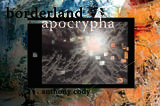
Rather than a proposal for re-imagining the US/Mexico border, Cody’s collection is an avant-garde examination of how borderlands have remained occupied spaces, and of the necessity of liberation to usher the earth and its people toward healing. Part auto-historia, part docu-poetic, part visual monument, part myth-making, Borderland Apocrypha unearths history in order to work toward survival, reckoning, and the building of a future that both acknowledges and moves on from tragedies of the past.
Borderland Apocrypha won Omnidawn's 2018 1st/2nd Book Prize.

Just as trade, finance, information, and technologies are moving rapidly across borders, so too have labor markets and transnational migrant communities. Migrants are sending large quantities of money back to their countries of origin in the form of philanthropy, remittances, and commercial investments. They are also sharing knowledge and skills learned or developed abroad. Is greater global equity an inevitable consequence of such diaspora philanthropy, or can this giving actually aggravate inequity? Diasporas and Development examines the positive—and sometimes negative—impacts of diaspora engagement in Africa, Asia, Central America, and the Caribbean.
How can the equity impact of this global giving be maximized? Might creative intermediary mechanisms or public policies help channel diaspora philanthropy in positive directions? They also explore motivations for the dark sides of diaspora engagement such as support for extremist organizations, organized crime, ethnic violence, and even civil war. Diasporas and Development aims to deepen the understanding of the promise and pitfalls of diaspora philanthropy and how it might help bridge the distances between societies in an unequal world.

Through a series of experimental poems centered on ecology, Anthony Cody’s The Rendering confronts the history of the Dust Bowl and its residual impacts on our current climate crisis, while acknowledging the complicities of capitalism. These poems grapple with questions of wholeness and annihilation in an Anthropocenic world where the fallout of settler colonialism continues to inflict environmental and cultural devastation. Cody encourages readers to participate in radical acts of refreshing and reimagining the page, poem, collection, and the self, and he invites us to reflect on what lies ahead should our climate continue on its current trajectory toward destruction.
These poems consider if wholeness, or a journey toward wholeness, can exist in the Anthropocene. And, if wholeness cannot exist in these times, we are invited to look at our lives and the world through and beyond annihilation.
READERS
Browse our collection.
PUBLISHERS
See BiblioVault's publisher services.
STUDENT SERVICES
Files for college accessibility offices.
UChicago Accessibility Resources
home | accessibility | search | about | contact us
BiblioVault ® 2001 - 2024
The University of Chicago Press









